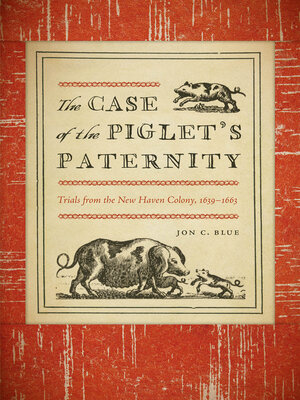The Case of the Piglet's Paternity
ebook ∣ Trials from the New Haven Colony, 1619-1963
By Jon C. Blue

Sign up to save your library
With an OverDrive account, you can save your favorite libraries for at-a-glance information about availability. Find out more about OverDrive accounts.
Find this title in Libby, the library reading app by OverDrive.



Search for a digital library with this title
Title found at these libraries:
| Loading... |
“Incomparable insight into an early colonial legal system thoroughly influenced by Biblical interpretations . . . sure to appeal.” —Harvard Law Review
In the mid-seventeenth century, judges in the short-lived New Haven Colony presided over a remarkable series of trials ranging from murder and bestiality, to drunken sailors, frisky couples, faulty shoes, and shipwrecks. The cases were reported in an unusually vivid manner, allowing readers to witness the twists and turns of fortune as the participants battled with life and liberty at stake.
When the records were eventually published in the 1850s, they were both difficult to read and heavily edited to delete sexual matters. Rendered here in modernized English and with insightful commentary by eminent judge Jon C. Blue, the New Haven trials allow readers to immerse themselves in the exciting legal battles of America’s earliest days.
The Case of the Piglet’s Paternity assembles thirty-three of the most significant and intriguing trials of the period. As a book that examines a distinctive judicial system from a modern legal perspective, it is sure to be of interest to readers in law and legal history. For less litigious readers, Blue offers a worm’s-eye view of the full spectrum of early colonial society—political leaders and religious dissidents, farmhands and apprentices, women and children.
“An engaging and intelligent microhistory of this time period and colony that nonlegal scholars can understand” —Journal of American Culture
In the mid-seventeenth century, judges in the short-lived New Haven Colony presided over a remarkable series of trials ranging from murder and bestiality, to drunken sailors, frisky couples, faulty shoes, and shipwrecks. The cases were reported in an unusually vivid manner, allowing readers to witness the twists and turns of fortune as the participants battled with life and liberty at stake.
When the records were eventually published in the 1850s, they were both difficult to read and heavily edited to delete sexual matters. Rendered here in modernized English and with insightful commentary by eminent judge Jon C. Blue, the New Haven trials allow readers to immerse themselves in the exciting legal battles of America’s earliest days.
The Case of the Piglet’s Paternity assembles thirty-three of the most significant and intriguing trials of the period. As a book that examines a distinctive judicial system from a modern legal perspective, it is sure to be of interest to readers in law and legal history. For less litigious readers, Blue offers a worm’s-eye view of the full spectrum of early colonial society—political leaders and religious dissidents, farmhands and apprentices, women and children.
“An engaging and intelligent microhistory of this time period and colony that nonlegal scholars can understand” —Journal of American Culture






